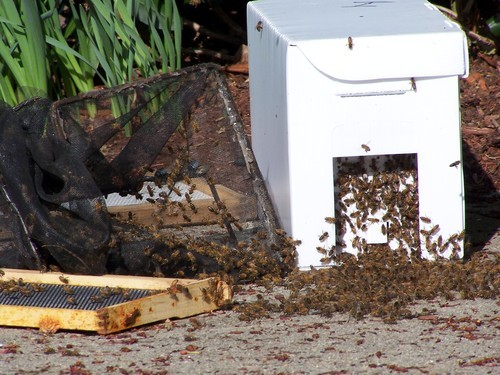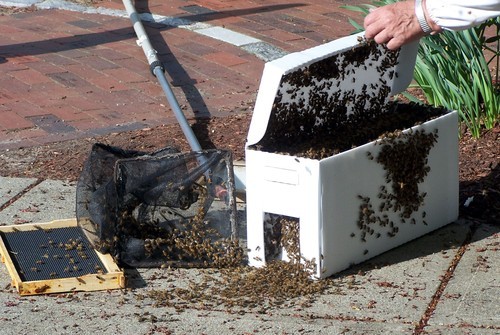
Bee season is here!
A honey bee swarm was recently discovered on the Library grounds. A honey bee swarm is an interesting phenomena in nature. One swarm may contain from 1,500 to 50,000 bees including workers, drones, and a queen. Swarming is an instinctive part of the annual life cycle of a honey bee colony. Honey bees should be left alone and appreciated from a distance, unless their nest comes in direct conflict with human activity.
Overcrowding in the nest, the presence of an old queen, and a mild winter are among the factors that predispose to the swarming impulse. Swarming is greatest when bees increase their population rapidly in late spring and early summer.
A swarm is not usually dangerous. Honey bees exhibit defensive behavior only in the vicinity of their nest. Defensive behavior is needed to protect their young and food supply. A honey bee swarm has neither young nor food stores and will not exhibit defensive behavior unless unduly provoked.
Swarming honey bees will settle on a tree limb, bush, or other convenient site. The swarm will send out scout bees to seek a cavity to nest in and will move on when a suitable nesting site is found.

Never attempt to remove a swarm of bees yourself. This is a job for a skilled expert from the Rhode Island Beekeepers Association.
Deborah Barchi, the Library’s Director, contacted John, the Beekeeper, to collect the swarm. John placed a suitable container on the ground below the swarm. The bees quickly moved into the “new” hive, which John then brought to his apiary.
This alternative to bee removal is a safer, more environmentally friendly method than using pesticides. Each year, many honey bee colonies are damaged or destroyed by pesticides, primarily insecticides. Besides the obvious environmental hazards of pesticide use, growers of most insect-pollinated crops, such as apples, raspberries, grapes and many others, experience lower yields, and ultimately the consumer must pay higher food prices.
* The above information was adapted from Ralph T. Vale, RI Beekeepers Association and Steven R. Alm, URI Entomologist; and the University of Nebraska Cooperative Extension.




